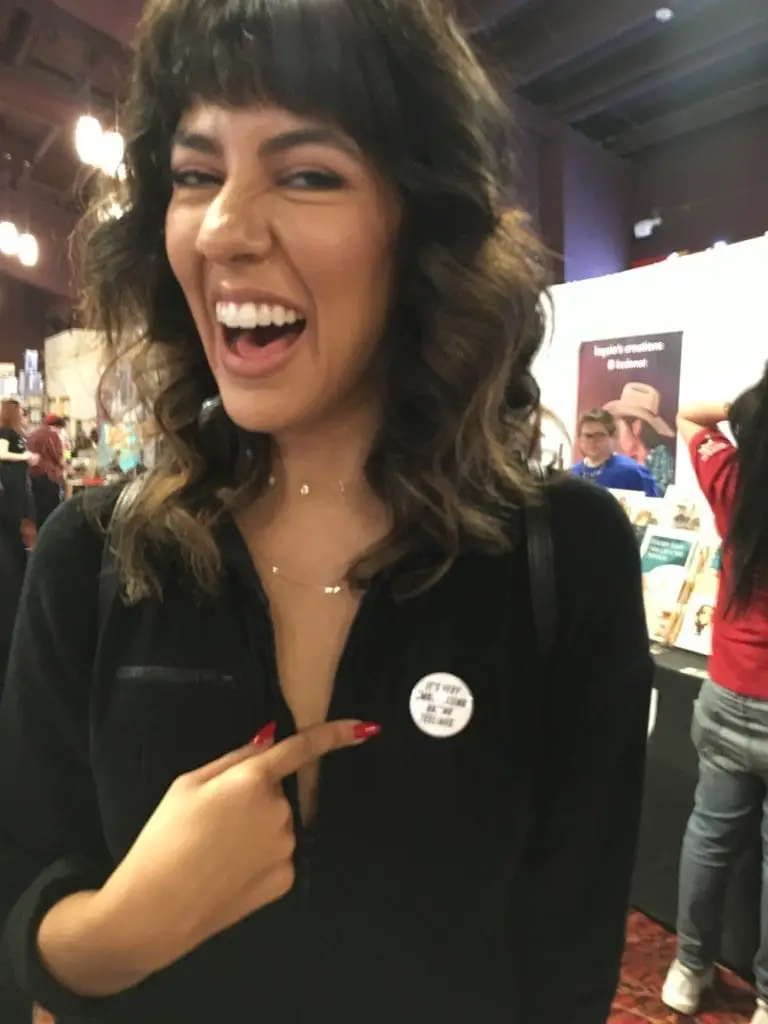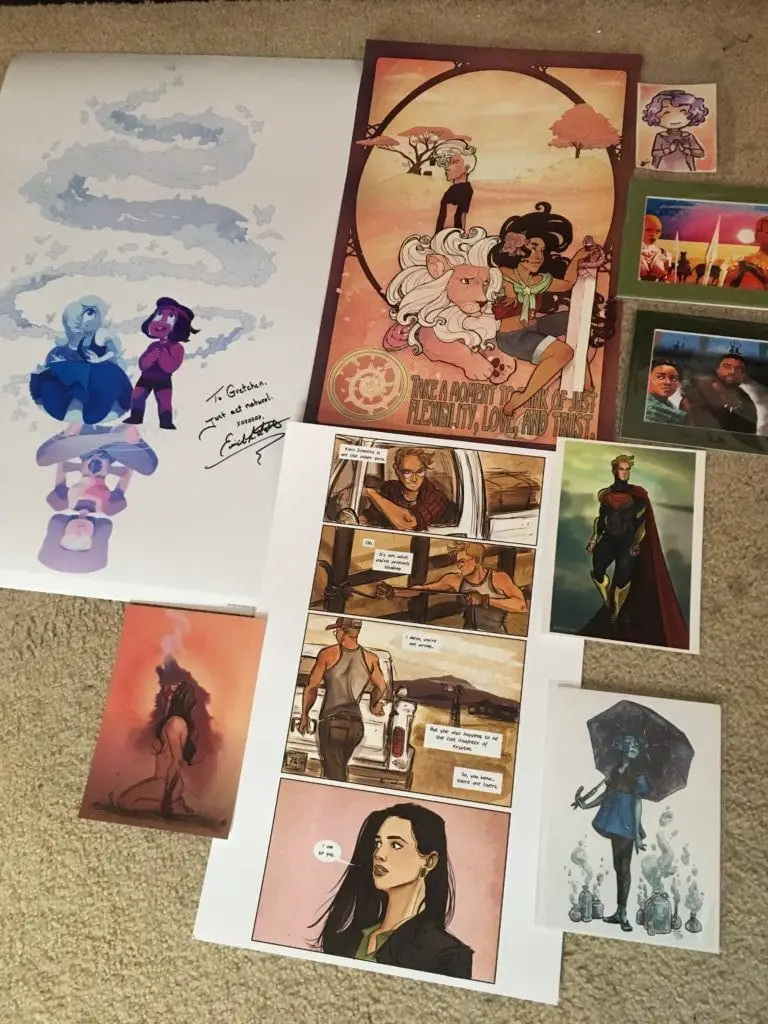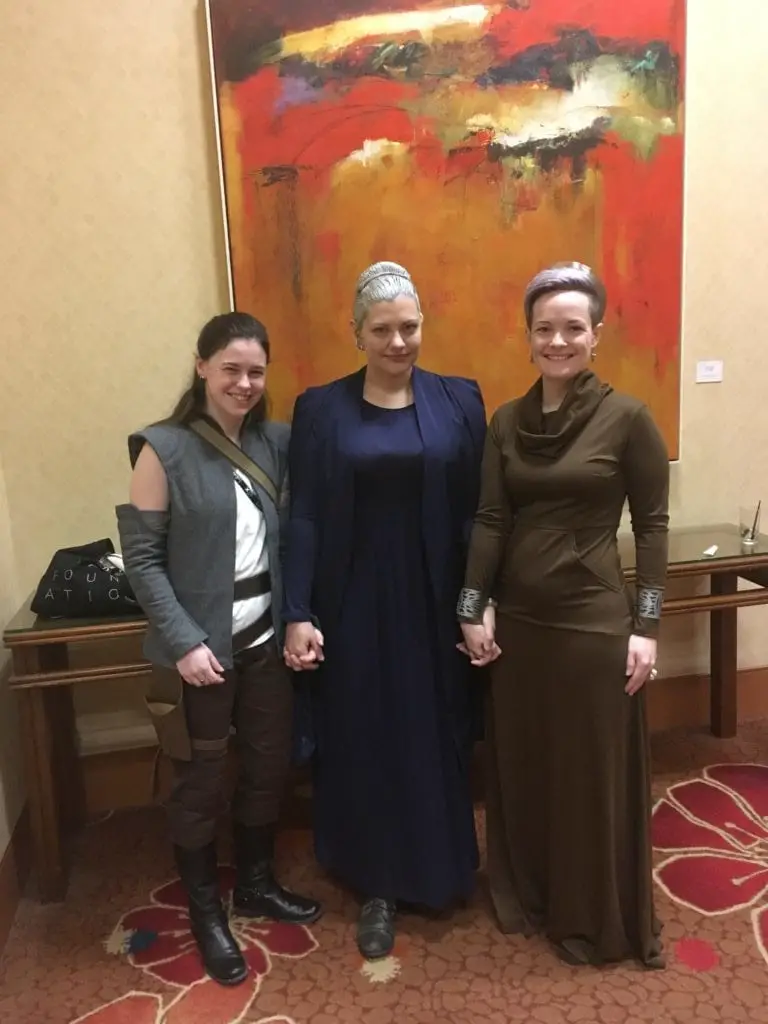It’s been a week since ClexaCon ended, and I finally feel up to talking about it. Not because I haven’t had anything to say, but because I’ve honestly been recovering from the worst con crud I’ve ever had for the past week (I’m still coughing and sneezing, but at least I don’t feel like I’m dying anymore and napping 3x a day!). However, the prolonged time has given me space to fully flesh out my initial reactions.
Coming home last year, I was more focused on how ClexaCon solidified my personal writing and career goals. This year is a little different. Rather than thinking about what the con means to me, as an attendee and panelist, I find myself reflecting on what it means to the queer actors and creators. What it means for them to have this space, too.
It all started at Ascension—the afterparty Saturday night. Several of the celebrities showed up and mingled with fans, something they didn’t have to do and showcased just how invested they were in us and our community. While watching Stephanie Beatriz get down with Isabella Gomez to the delight of the room, my friend Leah (one of the organizers of TGIFemslash, who we interviewed last year) pointed out that being surrounded by queer women who love her and her work must be a relief for Beatriz. For the first time, she gets to be the big star. Her existence as a queer woman of color is not just acknowledged but celebrated. That got me thinking: ClexaCon isn’t just a safe space for the attendees, it’s a safe space for queer actors, too.

Where else does Stephanie Beatriz get to talk openly about her bisexuality and the bisexuality of her character and be met with cheers? Where else does Erica Luttrell get to be openly affectionate with her girlfriend and be greeted not with disgust or avoidance but happy tears and heart-eyes? Where else can queer actors dress how they want and be surrounded by folks who look like them?
As attendees, we’re so used to thinking about how important the con is in providing a space for us to be visible and see ourselves reflected in everyone around us. That’s true. This year, I thought about that being true for the actors as well. Not just us, but they get to be in a room of women who are just like them. How often does that happen for them? Even in Hollywood, probably not all that often.
More than that, how often do they get to be the stars? How often do actors like Briana Venskus, Dot Marie Jones, Rachel Paulson, and Nicole Pacent get to be the actors that fans are lining up for and hype to get autographs, selfies, and photo ops with? How frequently do you think Elise Bauman and Natasha Negovanlis get to be some of the biggest stars in the room? When do these queer women get to be not just adjacent to the action, but the main attraction?
We’re here to see them and that means just as much to them as it does to us. They’re getting recognition and hype for being queer women who play queer female characters. They have space to celebrate who they are as much as we do. That’s HUGE.
And even for straight actors playing queer female characters, how often is it that the queerness of the role they’re playing is the main draw?
On Saturday, staff was shorthanded on volunteers in the autograph lines, so I signed myself up to help out. I ended up in Chyler Leigh’s line scanning tickets and let me tell you, I was getting emotional listening to fans talk to her. I’m sure at other cons she gets to hear stories like the ones I heard, but imagine that being the only story you hear over and over. “You’re so important to me as an actor because Alex helped me accept that I’m gay.” “Alex helped me come out to my parents.” “Alex’s conversation with Kara was exactly like talking to my sister, and I cried watching it because of how important that was to see.” All these and more.
For actors who truly care about the representation they’re embodying with their characters, as all the actors at ClexaCon do, being bombarded with love, support, and celebration of the work they’re doing must be one of the most fulfilling experiences. They might get flak from family, friends, or other people in the industry for portraying a queer character. They might have people say awful things to them because of the choice to support queer rep and do it well. But at ClexaCon, all they get is love. And them receiving that is important because they may not get it elsewhere.
That’s why I got so angry when I heard about how short the autograph lines were for Nafessa Williams after I finished my volunteer shift. She plays Anissa Pierce on Black Lightning—a literal bulletproof black lesbian and, in my opinion, the most important queer female superhero on TV right now (no offense to White Canary or Alex Danvers) because of that. Yet she wasn’t being given the same level of recognition as other actors were. This is her place to shine and be lauded for everything she’s doing for queer women of color representation and yet…it wasn’t happening the way I expected and wanted it to. Given the levels of racism and homophobia in our society, Nafessa Williams deserved to be celebrated at ClexaCon, because if not there, where else?
Because to me, ClexaCon isn’t just a chance to gush about ships—though I do understand why that’s such a huge draw—it’s a space to participate in and listen to conversations about layered identities. Where else can we discuss what it means to be queer and mentally ill? Or about being queer and disabled? Or queer and non-white? Where else do those conversations get to be not just in the margins, but the main attractions?
I participated in three panels this year, and what has surprised me most is that the one I’ve gotten the most positive feedback from is the Neurodiversity in Writing panel I moderated. (Fellow managing editor Kylie and Fandomentals writers Lisa and Kristen were the panelists.) Sure, I got a lot of people saying how much they loved the Korrasami panel and my Responsibility of Media Makers panel (you can find both of those panels on YouTube). But I’ve had more people go out of their way to email, Tumblr message, or tweet me and my fellow panelists about the neurodiversity panel.
That tells me something. It tells me that this is a conversation people are desperate to have but have no space for. They’re so grateful that we talked about it because no one else is making that space for them. Which, again, is why ClexaCon is so necessary and why it’s important that it not just be about shipping. Because we as queer women don’t get space to talk about ourselves and our layered identities anywhere else. And we need that if we’re going to change the way stories about us are told.
Panels such as these allow us to talk about ourselves and what we want to see when it comes to representation. They’re a form of activism because we’re advocating for our own stories. We have to carve this space out for ourselves because no one else will. And if we don’t have these conversations ourselves, how can what we say get back to the actual content creators in a way that they can listen to and reflect on when they’re creating art?
Most content creators don’t go online and listen to marginalized fans about how they want their stories told. Some do, but most don’t. As much as I hate that it has to be this way, conventions are a recognized means of bringing attention to issues in a way that content creators might be more likely to listen to. Even then, there’s no guarantee they will pay attention. Still, panels at a convention ‘look’ professional to the media industry and are more likely to be acknowledged. They spark conversations that can ripple into something bigger.
Nevertheless, some of the content creators are in the room and they’re listening to us. And I don’t just mean the industry professionals like Emily Andras of Wynonna Earp or Gloria Calderon Kellet and Mike Royce of One Day at a Time. It’s great to have advocates within the industry who are writing and creating nuanced queer stories and characters. But they aren’t the only ones who deserve our attention.
ClexaCon is bursting with original content creators who either haven’t found a way to break into the industry or want to do things differently. Three times as many booths filled the vendor hall this year. Most of the fanartists also create their own original art, and I saw more book booths this year than last year, which makes my bibliophile heart happy to see. We need more queer books and the queer books we do have deserve more recognition, especially those being produced outside of traditional publishing avenues.

ClexaCon presents a unique opportunity for queer women and allies to support queer content creators. There’s art or books to buy, films at the film festival to see, and plenty of time to talk about new projects and how to support a creator who is in media res. That’s why I always take cash with me to ClexaCon. I look at it as an opportunity to put my money where my mouth is by supporting queer original content creators.
It’s also why I take my microphone with me so that I can interview a creator or two for my Creator Corner series. I met Foley at ClexaCon last year—my all-time favorite fanartist for SuperCorp and Supergirl as well a really talented author and webcomic artist. This year, I met up with original fiction and fic author Rae D. Magdon to talk about her most recent book. I also caught up with the folks from the Clexa Project, who interviewed me last year and are still working on their documentary film about challenging industry standards for representation.
Not that everyone can do interviews or can afford to buy a lot of original art. The point is that I can. I have a position of relative privilege when it comes to spending cash and the added privilege of an online platform (however small it is) that I can use to benefit them. I truly believe that it’s my responsibility as a member of this marginalized community to do what I can to support and highlight queer artists creating original content. I say it’s what I want: more stories written by queer women about queer women. ClexaCon is a safe space where I can throw money at artists for making beautiful things and offer what little publicity I can. Because if we’re going to change the media industry and society to make it safer for people like us, we all have to get there together.
And that’s what I love so much about ClexaCon. Because when I’m there, I can see how it’s possible. I see queer actors being celebrated and queer characters being cheered for and fawned over. I see queer art and queer books and queer artists and writers making these beautiful things for us to enjoy. And I think about how important it is for everyone who is there that this space exists.
ClexaCon isn’t just for me. It’s for every queer actor who has never gotten the chance to be in the spotlight or celebrated for who they are. It’s for the actors playing queer characters to experience how powerful and necessary their allyship is first hand. It’s for queer content creators and storytellers to gain recognition and support for the hard work they do making art for us. It’s for all the panelists who spent time and energy preparing to talk about significant issues. It’s for the volunteers and staff to see their hard work come to fruition and for the fans and attendees to revel in the safety and joy of being in a room full of like-minded people.
And it’s for all the other queer women who can’t be there, too. Who might not be out or safe enough or able to afford to go. We celebrate with them in spirit and hold them in our hearts.
ClexaCon is, quite simply, a place for all queer women to shine and for all of us to be stronger together.


